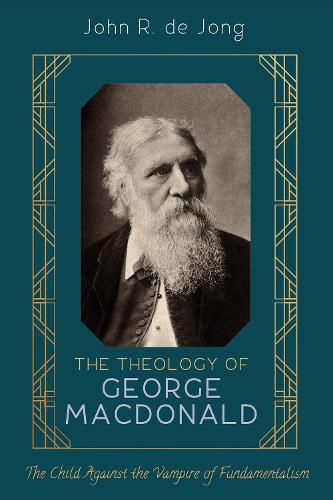Readings Newsletter
Become a Readings Member to make your shopping experience even easier.
Sign in or sign up for free!
You’re not far away from qualifying for FREE standard shipping within Australia
You’ve qualified for FREE standard shipping within Australia
The cart is loading…






This title is printed to order. This book may have been self-published. If so, we cannot guarantee the quality of the content. In the main most books will have gone through the editing process however some may not. We therefore suggest that you be aware of this before ordering this book. If in doubt check either the author or publisher’s details as we are unable to accept any returns unless they are faulty. Please contact us if you have any questions.
George MacDonald (1824-1905) was writing at a time of Evangelical unease. In a society ravaged by Asiatic cholera, numbed by levels of infant mortality, and fearful of revolution and the toxicity of industry (to name but a few of the many challenges), the gospel proclaiming eternal damnation for unbelievers was hardly good news; rather, Christianity was increasingly viewed as the source of bad news and a tool of state oppression. MacDonald agreed: in his view, the church had become a vampire sucking the blood of her children instead of offering them eucharistic life.
In contrast, like Christ, MacDonald brings before us a child. Although at first sight a familiar Romantic incarnation, in MacDonald’s theology the child becomes an unlikely icon challenging the vampire’s kingdom–a challenge reaching beyond the confines of Evangelicalism, confronting the foundations of much of Western theology.
This meticulously-researched study exploring MacDonald’s work–especially his realist and fantasy novels–in the light of its Victorian context is of more than historical interest. His incisive critique of church and empire have particular relevance today in light of the growing and troubling alliance between fundamentalist expressions of church and intolerant, right-wing politics. This volume considers MacDonald’s radical solution to religious vampirism; becoming children.
$9.00 standard shipping within Australia
FREE standard shipping within Australia for orders over $100.00
Express & International shipping calculated at checkout
This title is printed to order. This book may have been self-published. If so, we cannot guarantee the quality of the content. In the main most books will have gone through the editing process however some may not. We therefore suggest that you be aware of this before ordering this book. If in doubt check either the author or publisher’s details as we are unable to accept any returns unless they are faulty. Please contact us if you have any questions.
George MacDonald (1824-1905) was writing at a time of Evangelical unease. In a society ravaged by Asiatic cholera, numbed by levels of infant mortality, and fearful of revolution and the toxicity of industry (to name but a few of the many challenges), the gospel proclaiming eternal damnation for unbelievers was hardly good news; rather, Christianity was increasingly viewed as the source of bad news and a tool of state oppression. MacDonald agreed: in his view, the church had become a vampire sucking the blood of her children instead of offering them eucharistic life.
In contrast, like Christ, MacDonald brings before us a child. Although at first sight a familiar Romantic incarnation, in MacDonald’s theology the child becomes an unlikely icon challenging the vampire’s kingdom–a challenge reaching beyond the confines of Evangelicalism, confronting the foundations of much of Western theology.
This meticulously-researched study exploring MacDonald’s work–especially his realist and fantasy novels–in the light of its Victorian context is of more than historical interest. His incisive critique of church and empire have particular relevance today in light of the growing and troubling alliance between fundamentalist expressions of church and intolerant, right-wing politics. This volume considers MacDonald’s radical solution to religious vampirism; becoming children.